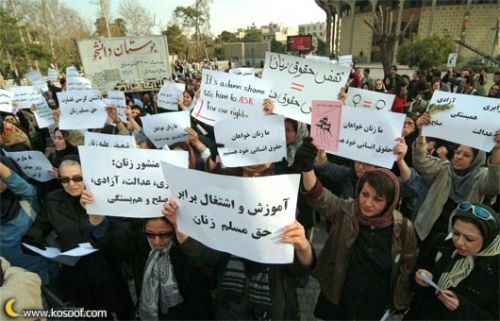
Azadeh Faramarziha
“Did you hear about Ms.…? She went out of the country. Her trial was held while she was outside. She doesn’t know if she can come back. She might be in danger…”
The conversation was about a woman activist in Egypt. I felt a slight tremor inside me as it threw me back in time to few years ago. Was it a déjà vu?
In mid 2009 when the Iranian uprising (known as the Green Movement) was brutally being suppressed by the government, lots of activists fled from the country. It was the second round of mass migration of activists since the Revolution in Iran. The first one happened during the dark years of 1980’s when the newly established regime massacred the leftists in the prisons.
On whether activists migrated either against their will or as a choice, one could write pages and pages. But I don’t see myself in this position. I simply witnessed a phase and went through it with all its ups and downs. Now after six years I see how important it is to share the experience since it is repeating itself (and most probably will be repeating itself again) in another country(s). I myself left the country three years ago. I am not a refugee though, which means I can go back whenever I want, while in this piece I am mostly talking about the political refugees who moved out of the country because of their social/political activities.
Opening this subject is not easy though. It might raise a sense of misunderstanding on two levels: one, from my friends and fellow activists who would interpret this piece as a judgment and two, the readers from other countries who would call it a false comparison. But this piece is neither a judgment nor a comparison. It is (or at least what I’m trying to do is) to tell a simple story of “what happened” and not even how it happened and why. And I believe a very simple “what happened” is politically important. It is also important to mention that this story is not happening in a black and white world and it is not easy to make generalized statements about activists who left and those who stayed.
I will try to summarize some of the issues and challenges we faced as a result of mass migration of the activists. These points might be interrelated or one causes the other.
Please note that by “We” I mean women’s rights activists, and in particular members of the One Million Signatures Campaign in Iran.
Ok. Once upon a time…
The Discourse of Us and Them
The Women’s Right Movement in Iran was persisting with its activities and challenges when the Green Movement started on June 2009. The most significant aspect of the Green Movement was the big scale demonstrations which had not happened in Iran for years. So it was quite normal that it could attract the activists from different fields. Feminists took part vastly in these demonstrations and they tried to inject their idea of gender equality to the body of the Movement. We were in the streets, chanting and shouting; it was like a dream come true.
Then the suppression started: the detentions, the beatings, the batons, tear gasses and even killing. A large number of people got arrested, many were charged with long sentences; many are still in prison and many others fled.
The first consequence of migration appeared by the discourse of “Us” and “Them”; the ones who stayed and the ones who left. This division broke our coherence (if not our unity) on two levels of context and action. Suddenly we belonged to two different contexts and the actions that we defined based on each context were different. This difference grew more by time and amplified the discourse of us and them even more.
The newly immigrated activists had to try to stay connected to the context they had left while also discovering their positions within the new context. This challenge, along with the speed of incidents inside the country, created a distance between them and their fellows inside which made their ideas in some cases completely out of context. As an example to clarify this issue, I can recall once when one of the activists was arrested and after a month she went on hunger strike. Activists were trying to make the authorities to acknowledge her rights as a political prisoner by campaigning and using social media-- the only possible ways at that stifling atmosphere of those days. Then suddenly we received an idea from one of the newly-immigrated-friends that was asking us to go on hunger strike collectively in front of the prison. Well...it might not be a bad idea by nature...but in Tehran...those days…!
Such example represented a bigger challenge between us: our fellows in the new context would have to send their ideas to us to actually do it. And it became more problematic by time.
I remember that some of us discussed this issue that we should not highlight the discourse of us and them or inside/outside, we should not consider the ones who left as cowards and the ones who stayed as heroes! And this discourse would damage the movement. But sadly there were people within the movement who basically provoked this issue intentionally or unintentionally and I will explain later how the authorities used this in order to increase the gap between the activists.
Communication
Iran, and specifically Tehran, was on fire. Things were changing on a daily basis and no one knew what was going to happen tomorrow. In such a situation, the process of decision making or taking an action also needed to be immediate and spontaneous. Today they arrest someone, tomorrow you would have to do something about it.
In order to keep continuous communication, activists created some mail groups in which sometimes more than 200 people were subscribed. We circulated the news in these groups and discussed the ideas. These groups were supposed to keep us connected (and they did at some points) but to be honest it was not a very successful practice. The first issue was the internet in Iran which the authorities speeded it down constantly in order to limit the communications and prevent the dissemination of news. So basically sometimes it was impossible for activists inside the country to open an email containing 100 conversations. In addition to that following up with these 100 conversations was another obstacle; if you couldn’t check your email for two hours, you would have lost the whole idea. The second issue was timing; managing 5 to 12 hours time difference especially in urgent situations was difficult. And the third issue I believe lies on the nature of virtual [long] conversations: misunderstanding, vagueness and lack of transparency. Besides, reading and answering all the conversations was so time consuming. That is why rarely a conversation or discussion reached an end in the mail groups.
All of these issues led us to stop using the groups after a couple of years and continue our communications in smaller groups with limited number of “closer” friends.
Who Deserves More?
In the process of decision making in a group, sometimes there are disagreements. At the time of disagreement, who deserves more to make the last decision? Here we faced the challenge of place and position. We all needed to be adjusted based on the new situation.
The struggle of inside/outside overwhelmed us. Some of the outsiders couldn’t define a right position toward the movement while some of the insiders decided to monopolize it and ignore the rest. On one hand the outsiders were giving us agendas and on the other hand the insiders were deleting them from the groups.
Unfortunately what was sacrificed in between was our common goal, our common work.
The Role of Power
What is the most desirable movement for a system who intends to break it? The disorganized incoherent movement that every piece of it is scattered here and there. The system benefited the most from all of these. Directly or indirectly they tried their best to disconnect us day by day.
Their direct method was for example to arrest an activist when s/he was coming back from outside and start asking him/her who s/he has met there and etc. But their indirect methods were more insufferable as they tried to break the trust between the activists. These sentences in interrogation sessions have been heard several times: “what your fellow activists are doing outside the country is worsening your situation” or “you have no idea what relations they have outside the country, they are funded by western government,” or “they are dictating their agenda to you.” Of course the issue is not about believing these accusations or not. The issue is about increasing the price activists would have to pay in order to keep the connection with their fellows outside. This sometimes generated this question between the activists whether they should be connected or not, they should work together or not. Within the movement we never had a united yes or no answer (was it ever desirable to have “one” answer?). So the result was that sometimes we all worked together and sometimes we did not, and this disturbed the balance in our communications and intensified the discourse of us and them, inside/outside.
Models of Migration
It is an important point that the ways people chose to leave the country could influence their relationship with a movement; from how you make your decision to leave to how you discuss it with your fellows and how you feel responsible about the consequences on your group etc. All of these would define your next position toward your movement.
According to our experience whenever this decision has been made collectively and in accordance with the strategies of the collective, the process progressed firmly and with minimum of tension...and vice versa!
Of course sometimes the force and emergency would prevent people to take their steps as they want and understanding this is not that difficult. But I think that feeling the responsibility of being part of a collective would always provide people with a way to direct their “personal” decisions in line with the benefits of the collective. It’s challenging...but trust me it’s worth trying.
And finally…
-
We can always see the bigger picture. So in a bigger picture this phase might be presented as a good, positive step for Iranian feminists who experienced the world, got to know feminists from other countries, made networks, and learned about working on different scale, etc. Although most of these achievements are currently on a personal level, but in a bigger picture it might benefit the movement in the future. Who knows?
-
The mass migration played a big role in deactivating the feminist movement in Iran. However it was not the only factor. There are numerous other factors and many of them are not actually under our control.
-
Apparently our challenge with the issue of migration was not a complete success. At the same time generating this experience to all the movements, all the countries seem unreasonable. But sharing such experiences could suggest new ways to resolve the challenges in a better way and prevent similar obstacles and difficulties for the feminist movement in any country.
Publisher:
Section:
Category:






